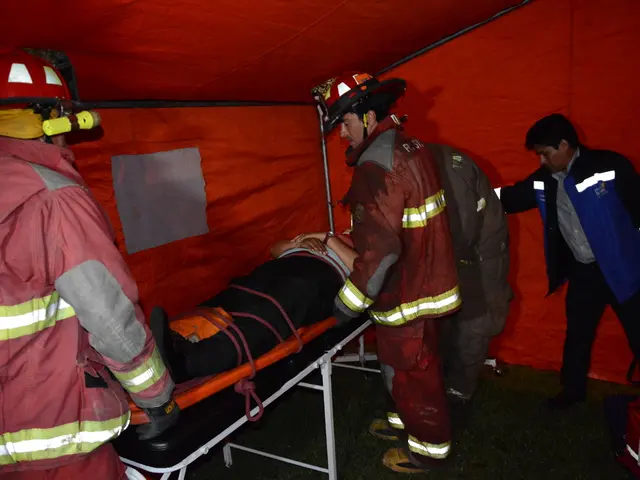Regular Exercise Equals Drug Use in Preventing Colon Cancer Recurrence
In the realm of cancer, colorectal malignancies rank among the top three globally, accounting for a whopping 10% of all cancer cases. Recently, Canadian researchers have kickstarted a flurry of excitement with a groundbreaking study. They discovered that compared to standard health advice, a structured exercise program following colon cancer surgery and chemotherapy could potentially reduce recurrence by a staggering 28%. The study, published in The New England Journal of Medicine (NEJM), took things a step further, revealing that structured exercise reduced the general risk of death by a substantial 37%.
Experts are buzzing over these findings, with many suggesting the exercise program could be a game-changer in the battle against colorectal cancer recurrence. According to David Sebag-Montefiore, a proficient oncologist from the University of Leeds, this intervention holds exciting potential, as it offers benefits without the adverse side effects associated with conventional treatments.
The researchers behind this transformative study recruited 889 participants from Canada, Australia, the United States, the U.K., and France. Each participant had undergone surgery for stage 3 or high-risk stage 2 colon cancer followed by adjuvant chemotherapy to prevent the cancer's return. The participants ranged from 19 to 84 years, with a median age of 61.
Over 90% of participants displayed an overweight or obese BMI, while none exercised for more than 150 minutes per week before the trial. Researchers then divisioned participants into two groups – the exercise group, which included 445 patients, and the health-education group comprising 444 patients.
The exercise group worked closely with certified physical activity consultants for three years. During the first six months, consultants monitored participants weekly, followed by bi-weekly for the subsequent six months, and monthly for the final two years. Participants could choose the type, frequency, and intensity of aerobic exercise but aimed to reach the equivalent of three to four brisk 45 to 60-minute walks weekly.
On the other hand, the health-education group received material promoting general health, physical activity, and nutrition, in addition to standard surveillance.
At a median follow-up of 7.9 years, the exercise group fared significantly better, with an annual incidence of recurrence, new primary cancer, or death of 3.7%, compared to 5.4% in the health-education group. In addition to these figures, 80.3% of patients in the exercise group remained disease-free after five years, compared to 73.9% of the health-education group.
While it is essential to stress that the study does not suggest eliminating drug treatments, the substantial advantages of incorporating a structured exercise program into colon cancer management are undeniable. On top of improved physical functioning, disease-free survival, and reduced risk of recurrence, exercise also offers a host of other benefits, such as improved mental health, reduced fatigue, and a lower risk of developing cardiovascular disease.
Perhaps most impressive, the structured exercise program is substantially cheaper than many cancer medications, potentially opening the door to more accessible and cost-effective cancer management strategies for patients worldwide. However, challenges remains in terms of providing sufficient personnel and support to ensure the broad implementation of such exercise programs.
As we continue to explore the remarkable capacity of exercise to combat cancer, we can look forward to an increasingly holistic approach to cancer management, one that harnesses the power of physical activity and empowers patients to take control of their healing journey.
- The study's findings in the field of oncology are causing a stir, focusing particularly on colorectal cancer.
- This research suggests that a structured exercise program could significantly decrease colorectal cancer recurrence.
- The research, published in NEJM, indicates that structured exercise also reduces the general risk of death by 37%.
- Experts are excited about the exercise program's potential, as it offers benefits without the side effects of conventional treatments.
- The study recruited participants from Canada, Australia, the US, the UK, and France who had undergone colon cancer surgery and chemotherapy.
- The exercise program, led by certified physical activity consultants, aims for the equivalent of three to four brisk walks weekly.
- The health-education group received materials promoting general health, physical activity, and nutrition, in addition to standard surveillance.
- After a median follow-up of 7.9 years, the exercise group showed significantly better results, with an annual incidence of recurrence, new primary cancer, or death of 3.7%.
- The study doesn't suggest eliminating drug treatments, but the benefits of incorporating a structured exercise program into colon cancer management are undeniable.
- Improved mental health, reduced fatigue, and a lower risk of developing cardiovascular disease are additional benefits of the structured exercise program.
- The structured exercise program is cheaper than many cancer medications, potentially making cancer management strategies more accessible and affordable.
- Challenges remain in providing sufficient personnel and support to ensure the broad implementation of such exercise programs.
- As we delve deeper into the power of exercise in cancer management, we can anticipate a more holistic approach that empowers patients to take control of their healing journey.
- Beyond colorectal cancer, structured exercise programs could potentially benefit other chronic diseases, such as chronic-kidney-disease, COPD, type-2-diabetes, and neurological-disorders like Alzheimer's, migraine, and multiple sclerosis. These programs could also improve digestive-health, eye-health, hearing, and overall health-and-wellness, including fitness-and-exercise, cardiovascular-health, skin-conditions, and autoimmune-disorders like psoriasis and rheumatoid-arthritis.








